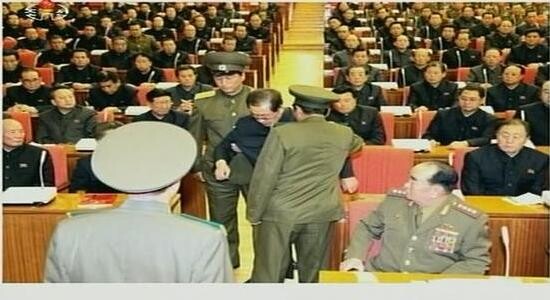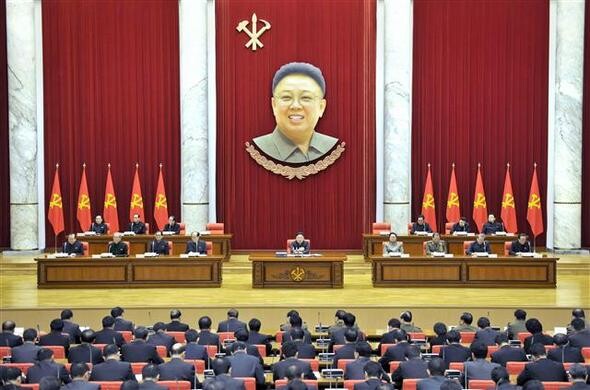hankyoreh
Links to other country sites 다른 나라 사이트 링크
[News analysis] The reasons behind Jang Song-thaek’s ouster

By Park Byong-su, senior staff writer
North Korea confirmed the ouster of Workers’ Party of Korea administrative department head Jang Song-thaek at an expanded meeting of the Political Bureau of the party’s central committee on Dec. 8.
“A written decision was adopted that relieved Mr. Jang of all duties and titles and expelled him from the party,” the announcement said.
The sudden purge of Jang, who was previously seen as the country’s second-in-command, is being taken as a sign that leader Kim Jong-un wants to proceed on his own and establish his power base.
Kim had already used personnel transfers and purges to try to escape the shadow of his father Kim Jong-il and strengthen his grip on power since taking over after the older Kim’s death in December 2011.

Powerful military figure Ri Yong-ho was relieved of his position as Chief of General Staff in July 2012, and former Cabinet Premier Pak Pong-ju was reappointed this past April. Now, with the removal of Jang, an influential party figure, most of the key positions in the party, military, and government have been shaken up.
On Dec. 6, South Korea’s National Intelligence Service reported to the National Assembly Intelligence Committee that around 40 deputy general director-level figures in the party, 30 senior cabinet figures, and over 20 army corps commander-level generals had been replaced since Kim Jong-un took over.
In one sense, Jang’s ouster shows the cold reckoning of a leader unwilling to tolerate a second-in-command. But the fact that the person targeted for removal was Kim’s own uncle (through marriage to aunt Kim Kyong-hui) also sends a warning that he will not accept challenges from anyone - even relatives and in-laws.
In its report on the politburo meeting, the Korean Central News Agency made repeated reference to Kim’s absolute authority, using expressions such as “centering on a system of monolithic leadership,” “the ideas and leadership of Comrade Kim Jong-un,” and “death-defying defense of the party center.”
One unusual twist has to do with the list of deeds Jang was accused of, which included not only the official charges of “anti-state, anti-revolutionary factional activities,” but also personal vices such as illicit relationships with women, gambling, drug use, and squandering of foreign currency.
This could be taken as evidence of a serious corruption and immorality problem in the North Korean leadership, with Kim taking the opportunity of Jang’s removal to send a warning message.
The decision not to level the conventional “espionage” or “toadyism” charges against Jang, a major figure behind the scenes in relations with China, was seen as an attempt to avoid stepping on toes in Beijing.
With Jang’s purge, no challengers to Kim’s authority appear likely to surface for the time being. Following the NIS report on Dec. 6, Jung Cheong-rae, the Democratic Party’s senior member on the intelligence committee, predicted that the next stage for North Korea would be one of “blind obedience to Kim Jong-un and a loyalty battle among the different senior cadres.”
But some suggested Jang’s removal may only hurt the regime’s stability further. Kim Yeon-soo, a professor at the Korea National Defense University, said the situation suggested Jang had been “forced out before Kim Jong-un had a chance to fully make use of him in establishing himself completely on his own. We’re going to have to watch and wait.”
Attention is now turning the so-called “Big Five” who received the title of “general” alongside Kim Jong-un in Sept. 2010 - Kim Kyong-hui, Choi Ryong-hae, Hyon Myong-chol, Choi Pu-il, and Kim Kyong-ok - to see if any of them are drafted to support the leader’s regime. All are known to be holding down key positions in the party or military, with Choi Ryong-hae serving as chief of the military’s general political bureau. At the same time, a newer group is moving up the ranks, including Pak Tae-song, deputy director general in the WPK central committee and Kim Won-hong, who was appointed State Security Minister last April.
For now, it is unclear what kind of domestic and foreign policies Kim’s regime will enact. Most experts agree the broader scheme will probably remain unchanged, with a two-track focus on nuclear weapons and economic development.
North Korean reports on Jang’s ouster offer some interesting hints about the policy course ahead. Specifically, Jang was accused of “preventing the honoring of the Great Leader [Kim Il-sung] and Great General’s [Kim Jong-il] teachings to develop self-sufficient iron, fertilizer, and vinylon industries by selling off the country’s precious resources at rock-bottom prices.”
This reads as both a warning not to allow too many underground resources, such as metal and coal, to end up in China, and a declaration that Pyongyang is still adhering to a philosophy of “success through our own efforts” and an autonomous, self-sufficient economy. It also suggests that any reforms and openness measures that come may be limited in scope.
Jang was also accused of “impeding economic projects and the improvement of the people’s living standards by violating the principles of the Cabinet-centered system and Cabinet responsibility system as indicated by the party.”
Both systems were previously mentioned in a speech by Kim for the “Day of the Sun” holiday to mark his grandfather Kim Il-sung’s birthday on April 15. At the time, he indicated the country should be changing course to emphasize “quality of life improvements” over the arms industry.
“We must set up rules and systems so that all issues that arise in economic projects go before the Cabinet and are resolved under the Cabinet’s unified command,” Kim said in the speech.
Kim’s reaffirmation of the principles were taken as a sign of support for Pak Pong-ju, an instrumental figure in the July 1 Economic Improvement Measures of 2002.
Please direct questions or comments to [english@hani.co.kr]

Editorial・opinion
![[Guest essay] The real reason Korea’s new right wants to dub Rhee a founding father [Guest essay] The real reason Korea’s new right wants to dub Rhee a founding father](https://flexible.img.hani.co.kr/flexible/normal/500/300/imgdb/original/2024/0423/8317138574257878.jpg) [Guest essay] The real reason Korea’s new right wants to dub Rhee a founding father
[Guest essay] The real reason Korea’s new right wants to dub Rhee a founding father![[Column] ‘Choson’: Is it time we start referring to N. Korea in its own terms? [Column] ‘Choson’: Is it time we start referring to N. Korea in its own terms?](https://flexible.img.hani.co.kr/flexible/normal/500/300/imgdb/original/2024/0423/3617138579390322.jpg) [Column] ‘Choson’: Is it time we start referring to N. Korea in its own terms?
[Column] ‘Choson’: Is it time we start referring to N. Korea in its own terms?- [Editorial] Japan’s rewriting of history with Korea has gone too far
- [Column] The president’s questionable capacity for dialogue
- [Column] Are chaebol firms just pizza pies for families to divvy up as they please?
- [Column] Has Korea, too, crossed the Rubicon on China?
- [Correspondent’s column] In Japan’s alliance with US, echoes of its past alliances with UK
- [Editorial] Does Yoon think the Korean public is wrong?
- [Editorial] As it bolsters its alliance with US, Japan must be accountable for past
- [Guest essay] Amending the Constitution is Yoon’s key to leaving office in public’s good graces
Most viewed articles
- 1[Guest essay] The real reason Korea’s new right wants to dub Rhee a founding father
- 2Terry Anderson, AP reporter who informed world of massacre in Gwangju, dies at 76
- 3Why Korea shouldn’t welcome Japan’s newly beefed up defense cooperation with US
- 4[Column] ‘Choson’: Is it time we start referring to N. Korea in its own terms?
- 5Senior doctors cut hours, prepare to resign as government refuses to scrap medical reform plan
- 6Opposition calls Yoon’s chief of staff appointment a ‘slap in the face’
- 7[Column] The clock is ticking for Korea’s first lady
- 8New AI-based translation tools make their way into everyday life in Korea
- 9[Editorial] Japan’s rewriting of history with Korea has gone too far
- 10[Column] Are chaebol firms just pizza pies for families to divvy up as they please?